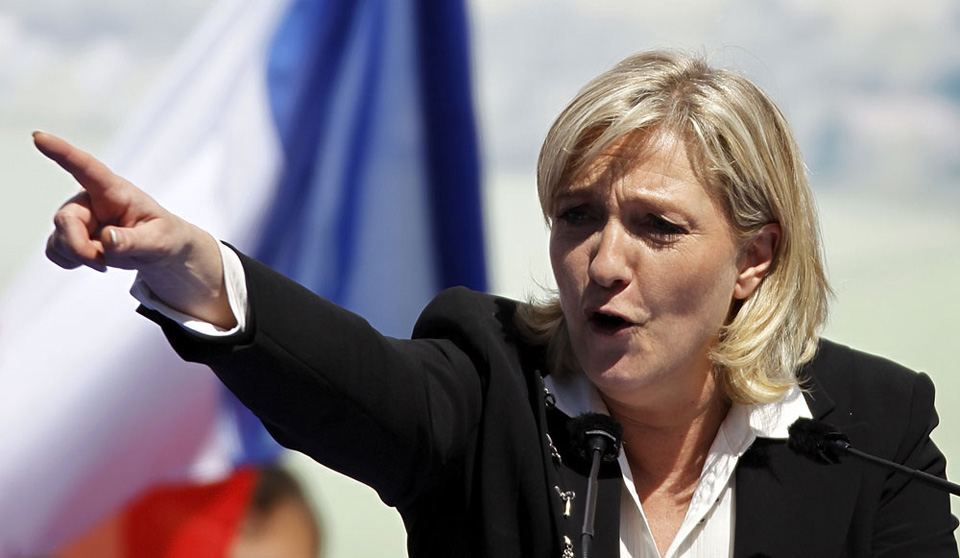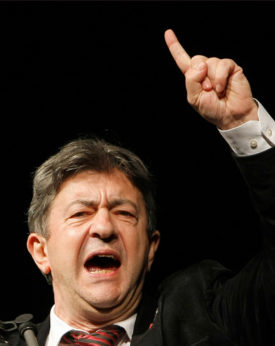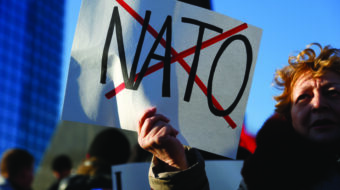
The next big wave to hit global politics could be France’s presidential election in the spring. Marine Le Pen, the leader of the Front National, daughter of Holocaust denier and founder of the neo-fascist movement Jean-Marie Le Pen, is widely tipped to make it through to the second round in the race for the country’s head of state.
It’s not just her racist politics that threatens to turn Europe and the world upside down, it’s also her strident anti-EU stance. She has pledged to seek new terms for France’s membership of Europe’s 27-nation political and economic bloc. She then plans to follow up with a referendum asking voters if they want to leave. She argues, correctly, that EU membership has drastically curtailed France’s sovereignty, on matters of immigration, but also monetary and fiscal policy.
The challengers
The main challenger to Le Pen is seen as Francois Fillon from the Republicans, the traditional right. On the surface, the contest between them resembles the battle between Jacques Chirac, from Fillon’s party, and Le Pen senior in the run-off ballot for president in 2002. Chirac, who easily reached the finishing line thanks to Socialist Party support, fitted the more moderate conservative mold of “Gaullism,” named for former French leader Charles DeGaulle, which saw a big role for the state in the economy.
Fillon, however, is a closer fit with the neoliberalism associated with names like Margaret Thatcher and Ronald Reagan.
The Socialist Party meanwhile, having ruled for the last four-and-a-half years, is in deep crisis. Outgoing head of state Francois Hollande has an approval rating of just 4.5 per cent, according to an Ipsos poll published last month. He won power in 2012 on promises of a radical agenda of soaking the rich, tackling widening inequality, slashing unemployment, and standing up to the austerity agenda of Europe’s superpower, Germany. He failed on all fronts.
A 75 per cent tax on those with earnings above €1 million was dropped; unemployment is now at exactly the same level it was in 2012 – 9.7 per cent; and youth joblessness is over 25 per cent. Income inequality has increased more in France than in many other wealthy countries, according to an OECD study published last year.
And Germany, with its ultra-conservative concept of managing the public finances, is now undisputed leader of Europe with countries like Greece paying the price. Hollande’s failure to live up to his platform is seen by many as a betrayal only topped by former Socialist president Francois Mitterrand’s reign in the 1980s, which likewise saw a retreat from a progressive program once in office.
Hollande has now announced he will not be running again. This week, the names for the Socialist Party presidential nomination candidates are due to be announced for the primaries that will be held in January. Most are expected to be various flavors of the “third way” recipe.
The last left-winger standing?
The only politician of any profile still championing a recognizably left-wing agenda is Jean-Luc Mélenchon, a 65-year-old who came fourth in the 2012 election with 11 per cent of the vote. He’s thrown his hat in the ring again and could secure as much as 15 per cent in the first round next year, one poll suggests. That wouldn’t allow him to qualify for the run-off, but it would be a further humiliation to the Socialist Party.

Mélenchon was education minister under prime minister Lionel Jospin in the early 2000s, a government that introduced France’s last great genuine reform, the 35-hour workweek. He left the Socialist Party in 2008 in response to the party’s tight embrace of the free market. Mélenchon’s program – which has literally gone viral on his brilliant use of social media – calls for France to exit European treaties (although not the Euro).
He is also calling for big raises for the low-paid and a stop to the hyper rich “gorging themselves.”
Mélenchon is also highly critical of Germany’s chancellor, Angela Merkel, who stands accused of using her country’s economic muscle to impose public spending cuts on other nations, including France. Merkel pursues this path even as the euro monetary system already benefits Germany (by making its exports cheaper than they would be under the Deutschmark) at the cost of other members (making their exports more expensive). Germany’s agenda of forced spending cuts has created sharp north-south economic imbalances that have made Europe thoroughly disunited.
France’s Communist Party is backing the former socialist’s bid, as it did in 2012, although it remains coy about what it will do if, as expected, he doesn’t make through to the run-off.
The Communists’ program has much in common with Mélenchon’s, including still vague ideas of how to forge a new relationship with other European countries that works for ordinary French people.
The rise of a more virulently pro-market position on the traditional right, and above all of Le Pen, is indicative of the center-left’s failure to stand up for the 99 per cent. It is manifested in a steady a trailing away of voters who have traditionally supported social democratic and communist parties.
“Frexit”?
The left’s loss of support is also rooted, at least partially, in a deep sense among the public that the European project has undermined democracy and national identity.
Le Pen talks of an exit from NATO — as does Mélenchon — and a closer relationship with Vladimir Putin’s Russia (which Mélenchon does not).
On the continent at least, there is still an argument about how much far-right extremism can be challenged within the framework of the EU and especially the single currency. That is, within the euro and even the EU, how much can a government implement genuinely radical progressive change that reverses the shift of power now concentrated into so few hands? Greece and its experience of Syriza in power – lorded over by the IMF, the European Central Bank and other EU governments – suggests very little.
But does this mean “Frexit,” a French exit from the EU – which in practice would mean the end of the European bloc – is inevitable?
It seems inconceivable that France could turn its back on the Europe it co-founded with Germany to cement peace (and also build capitalism) after the second world war.
But sentiment in another pro-Europe member state, Italy, which was a signatory of the Treaty of Rome in 1957, has gone sour. There, the only party with this line, the Democrats, is now in deep trouble after Matteo Renzi’s failed referendum earlier this month.
In France, a poll published by Ifop over the summer suggested just a slim 53 per cent majority of French were in favor of staying in the EU. Yet, who believes opinion polls these days?
Perhaps the “Frexiteers” are already in the majority. Maybe Mélenchon can pull it off where he failed last time and show how a new relationship can be built with Europe and the world that works for all, possibly setting in process a soft exit for all members of the EU.
If he doesn’t, Le Pen and her nasty politics may sooner or later triumph.
This article originally appeared in the British daily, Morning Star.

MOST POPULAR TODAY


Zionist organizations leading campaign to stop ceasefire resolutions in D.C. area

High Court essentially bans demonstrations, freedom of assembly in Deep South

Afghanistan’s socialist years: The promising future killed off by U.S. imperialism

Communist Karol Cariola elected president of Chile’s legislature






Comments